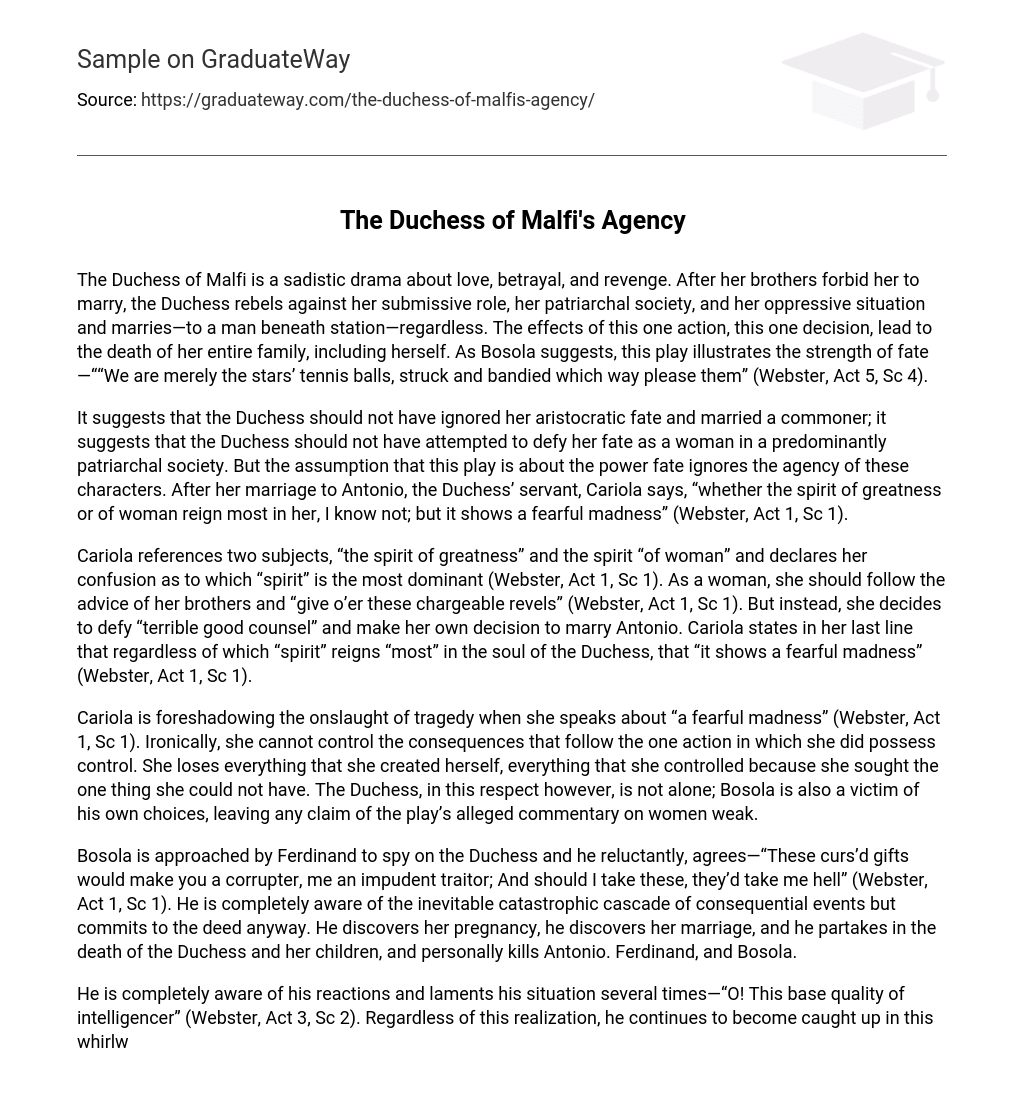The Duchess of Malfi is a sadistic drama about love, betrayal, and revenge. After her brothers forbid her to marry, the Duchess rebels against her submissive role, her patriarchal society, and her oppressive situation and marries—to a man beneath station—regardless. The effects of this one action, this one decision, lead to the death of her entire family, including herself. As Bosola suggests, this play illustrates the strength of fate—““We are merely the stars’ tennis balls, struck and bandied which way please them” (Webster, Act 5, Sc 4).
It suggests that the Duchess should not have ignored her aristocratic fate and married a commoner; it suggests that the Duchess should not have attempted to defy her fate as a woman in a predominantly patriarchal society. But the assumption that this play is about the power fate ignores the agency of these characters. After her marriage to Antonio, the Duchess’ servant, Cariola says, “whether the spirit of greatness or of woman reign most in her, I know not; but it shows a fearful madness” (Webster, Act 1, Sc 1).
Cariola references two subjects, “the spirit of greatness” and the spirit “of woman” and declares her confusion as to which “spirit” is the most dominant (Webster, Act 1, Sc 1). As a woman, she should follow the advice of her brothers and “give o’er these chargeable revels” (Webster, Act 1, Sc 1). But instead, she decides to defy “terrible good counsel” and make her own decision to marry Antonio. Cariola states in her last line that regardless of which “spirit” reigns “most” in the soul of the Duchess, that “it shows a fearful madness” (Webster, Act 1, Sc 1).
Cariola is foreshadowing the onslaught of tragedy when she speaks about “a fearful madness” (Webster, Act 1, Sc 1). Ironically, she cannot control the consequences that follow the one action in which she did possess control. She loses everything that she created herself, everything that she controlled because she sought the one thing she could not have. The Duchess, in this respect however, is not alone; Bosola is also a victim of his own choices, leaving any claim of the play’s alleged commentary on women weak.
Bosola is approached by Ferdinand to spy on the Duchess and he reluctantly, agrees—“These curs’d gifts would make you a corrupter, me an impudent traitor; And should I take these, they’d take me hell” (Webster, Act 1, Sc 1). He is completely aware of the inevitable catastrophic cascade of consequential events but commits to the deed anyway. He discovers her pregnancy, he discovers her marriage, and he partakes in the death of the Duchess and her children, and personally kills Antonio. Ferdinand, and Bosola.
He is completely aware of his reactions and laments his situation several times—“O! This base quality of intelligencer” (Webster, Act 3, Sc 2). Regardless of this realization, he continues to become caught up in this whirlwind of murder and deceit. He places responsibility of the tragedy on “the stars” but this only serves as a mask for his inability to control the consequences of his own choices. When Bosola kills Ferdinand, Ferdinand’s last dying words are “Whether we fall by ambition, blood or lust, Like diamonds we are cut in our own dust” (Webster, Act 5, Sc 5).
Ferdinand, the most monstrous of all the characters in the play, informs Bosola that regardless of the choices we make, indicated by his catalog of “ambition, blood or lust,” we are destroyed by our own choices, or as Ferdinand states “cut in our own dust” (Webster, Act 5, Sc 5). The metaphor of the diamond is interesting because it is associated with indestructibility and permanence. Like a diamond, the choices we make cannot be reversed or changed. They are what they are and we must deal with them in the manner in which they come.
This is a tragedy about the failure to obtain agency; in this work, everyone is fighting for control. The Duchess’ brothers, Ferdinand and the Cardinal, desire to control their lives through a variety of means—money, power, lust, and more importantly, the Duchess. They forbid her to marry so that they make keep their inheritance between them two and gain more money and agency. They ultimately die for their unreasonable thirst for control. The Duchess’ desires, in comparison, are seemingly simpler.
All she wants is a measure of control over her own life and a family of her choosing. However, in a She defies the threats of her brothers, rebelling against male authority by entering, as the Cardinal said “into some prison” by marrying regardless. The irony both exists and does not exist at the same time. The Duchess finally manages to gain the agency she desires but, as the resulting consequences unfold, she also manages to gain entry into a “prison” where she must face consequences that she cannot control.





